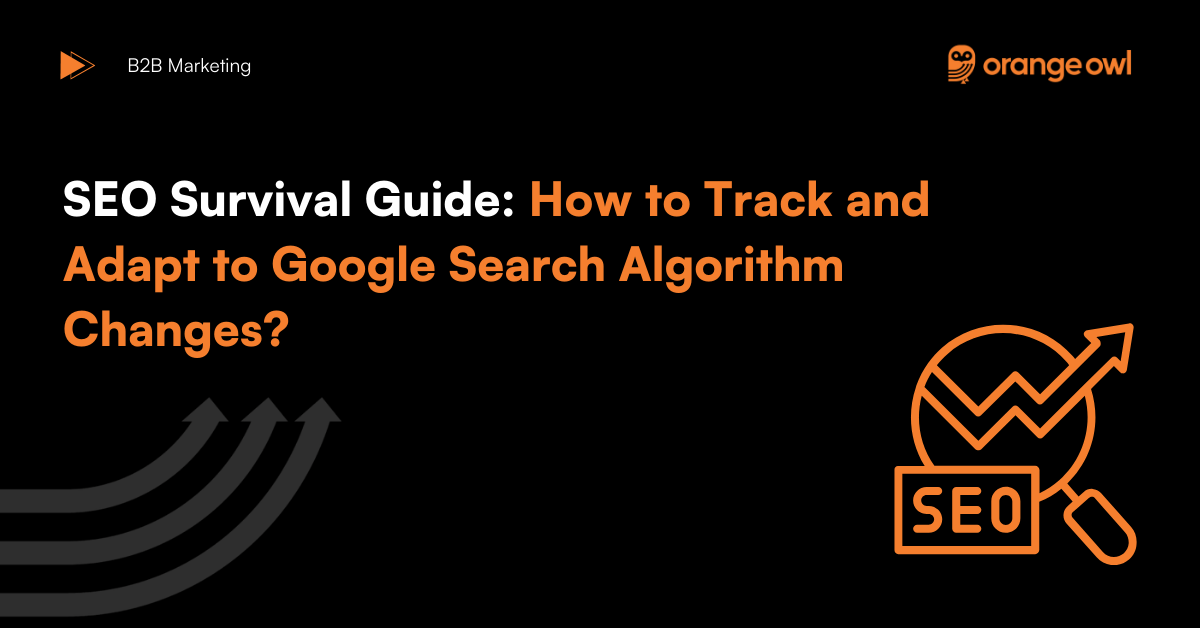SEO Survival Guide: How to Track and Adapt to Google Search Algorithm Updates?
Vivek Goel
February 8, 2025

Table of Contents
In today’s digital age, businesses heavily rely on digital marketing for branding, lead generation, and overall growth. A significant part of this strategy is inbound marketing, which hinges on the visibility of your website, blogs, and articles in Google search results. Given the constant updates to Google’s search algorithms, it’s crucial for businesses to stay informed about these changes and understand how to address any SEO issues that arise. Here’s a comprehensive guide on how to track and adapt to Google search algorithm updates and resolve ?related SEO challenges.
Why Staying Ahead of Google Search Algorithm Updates Matters?
Google frequently updates its search algorithms to improve the quality of search results. These updates can significantly impact the ranking of your website, potentially affecting your inbound marketing strategy. Being aware of these updates helps you:
- Maintain or improve your website’s ranking.
- Ensure that your content remains relevant and visible.
- Adapt your SEO strategies to align with the latest best practices.
- Avoid penalties that can result from outdated SEO tactics.
How to Stay Up-to-Date with Google Search Algorithm Updates?
Follow Google’s Official Channels
- Google Search Central Blog: This is the official source for announcements about changes to Google’s search algorithms. Regularly check the Google Search Central Blog for updates.
- Google Search Central on Twitter: Follow @googlesearchc on Twitter for real-time updates and tips.
Subscribe to the Top 10 Industry Google Search News Sites
- Search Engine Land: Visit Search Engine Land for comprehensive news and analysis on search engine marketing and SEO updates.
- Search Engine Journal: Check Search Engine Journal for news, guides, and expert insights into SEO and digital marketing trends.
- Moz Blog: Follow the Moz Blog for in-depth articles on SEO, algorithm updates, and best practices.
- SEO Roundtable: Stay updated with SEO Roundtable for daily news and discussions on SEO and search engine marketing.
- The SEM Post: Read The SEM Post for the latest news on search engine marketing and SEO updates.
- Ahrefs Blog: Follow the Ahrefs Blog for actionable SEO tips, strategies, and industry news.
- HubSpot Blog: Check the HubSpot Blog for comprehensive marketing and SEO insights.
- Neil Patel Blog: Visit the Neil Patel Blog for expert SEO advice, tips, and updates.
- Backlinko Blog: Follow the Backlinko Blog for advanced SEO strategies and updates.
- Yoast Blog: Read the Yoast Blog for SEO news, tutorials, and best practices.
Join Top 10 SEO Communities related to Google Search Algorithm Updates
- SEO Chat: Participate in discussions on SEO Chat to exchange knowledge and stay updated with industry peers.
- Warrior Forum: Join Warrior Forum for discussions on SEO, digital marketing, and more.
- Reddit: Subreddits like r/SEO and r/bigseo are excellent for staying updated on the latest discussions and issues in the SEO community.
- GrowthHackers: Engage with the GrowthHackers community for insights into SEO and growth marketing strategies.
- Inbound.org: Join Inbound.org to connect with other marketers and stay updated on the latest SEO and inbound marketing trends.
- SEO Signals Lab: Join the SEO Signals Lab Facebook group for discussions and updates on SEO.
- Digital Marketing Community: Participate in the Digital Marketing Community for insights and updates on SEO and digital marketing.
- Wicked Fire: Engage with the Wicked Fire community for SEO and digital marketing discussions.
- WebmasterWorld: Join WebmasterWorld for discussions on search engines and digital marketing.
- Black Hat World: Participate in the Black Hat World community for discussions on SEO tactics and updates.
Use TOP 10 SEO Tools with Update Alerts
- SEMrush: This tool offers alerts and updates on algorithm changes. It also provides insights into how these changes might affect your site. Check out SEMrush.
- Ahrefs: Similar to SEMrush, Ahrefs offers a comprehensive suite of tools for monitoring your site’s performance and staying informed about search engine updates. Visit Ahrefs.
- Moz: Moz offers tools and resources for tracking and responding to algorithm updates. Explore Moz.
- Google Alerts: Set up Google Alerts to get notifications about specific keywords or topics related to SEO and algorithm updates.
- Rank Ranger: Use Rank Ranger for rank tracking and updates on algorithm changes.
- Panguin Tool: Analyze the impact of algorithm updates on your site with the Panguin Tool.
- SERPWatcher: Monitor your rankings and stay updated on algorithm changes with SERPWatcher.
- Accuranker: Track your keyword rankings and get alerts on algorithm updates with Accuranker.
- SEO PowerSuite: Use SEO PowerSuite for comprehensive SEO tools and update alerts.
- CognitiveSEO: Stay updated on ranking changes and algorithm updates with CognitiveSEO.

Resolving SEO Issues
Despite your best efforts, SEO issues can arise. Here’s how to address them:
Identify the Issue
- Google Search Console: Use Google Search Console to monitor your site’s performance and identify issues. The tool provides detailed reports on indexing, traffic, and more.
- SEO Audits: Conduct regular SEO audits using tools like SEMrush, Ahrefs, or Moz to identify problems such as broken links, duplicate content, or poor site speed.
Fix Technical SEO Issues
- Broken Links: Use tools like Screaming Frog or Ahrefs to identify and fix broken links, ensuring all internal and external links point to active, relevant pages.
- Site Speed: Optimize your site’s loading speed using Google’s PageSpeed Insights. Compress images, leverage browser caching, and minimize JavaScript to improve performance.
Update Content
- Refresh Old Content: Regularly update old blog posts and articles to ensure they remain relevant. Add new information, update links, and optimize for new keywords.
- Optimize for Keywords: Use keyword research tools to find relevant keywords and integrate them naturally into your content. Avoid keyword stuffing, which can result in penalties.
Improve User Experience (UX)
- Mobile-Friendliness: Ensure your website is mobile-friendly. Use Google’s Mobile-Friendly Test to check your site’s mobile compatibility.
- Clear Navigation: Make sure your website’s navigation is intuitive and user-friendly. Clear menus and easy-to-find information enhance the user experience and improve SEO.
Monitor and Adjust
- Regular Monitoring: Continuously monitor your site’s performance using Google Analytics and SEO tools. Track key metrics such as organic traffic, bounce rates, and conversion rates.
- Adjust Strategies: Be prepared to adjust your SEO strategies based on performance data and algorithm updates. Flexibility and responsiveness are key to maintaining strong search rankings.
Expert Tips and Best Practices
Stay Educated
- Webinars and Conferences: Attend SEO webinars and conferences to learn from industry experts and stay ahead of trends. Notable events include MozCon, SMX, and Pubcon.
- Online Courses: Enroll in online SEO courses on platforms like Coursera or Udemy to deepen your understanding of SEO best practices.
Content Quality
- E-A-T (Expertise, Authoritativeness, Trustworthiness): Focus on creating high-quality content that demonstrates expertise, authoritativeness, and trustworthiness. This is particularly important for YMYL (Your Money or Your Life) pages.
- User Intent: Ensure your content aligns with user intent. Create comprehensive, informative content that answers the queries of your target audience.
Stay Ethical
- Avoid Black Hat SEO: Refrain from using black hat SEO tactics such as keyword stuffing, cloaking, or buying backlinks. These practices can result in severe penalties.
- Transparency: Be transparent about your SEO efforts and maintain ethical practices. Build a strong, sustainable SEO foundation.
Conclusion
Staying up-to-date with Google search updates is essential for any business relying on inbound marketing. By following the right resources, using the best tools, and implementing effective strategies, you can ensure your website remains visible and competitive. Regularly monitor your site’s performance, address SEO issues promptly, and stay informed about the latest developments in search algorithms. With these practices in place, your business can continue to thrive in the digital landscape.
By leveraging the insights and tools discussed in this blog, businesses can navigate the complexities of Google search updates and maintain a robust online presence. This proactive approach not only enhances visibility but also drives better engagement and conversions, ultimately contributing to long-term success in digital marketing.
Top Frequently Asked Questions (FAQs) for Tracking Google Search Algorithm Updates
Key signs that your website has been affected by a Google algorithm update include a sudden drop or increase in organic traffic, changes in keyword rankings, and fluctuations in click-through rates (CTR). Monitoring tools like Google Analytics and Google Search Console can help identify these changes. It’s important to compare your website’s performance before and after an update to assess the impact accurately.
Google makes minor updates to its search algorithms almost daily. However, major updates that significantly impact search rankings occur several times a year. These major updates are often announced by Google and discussed widely in the SEO community. Staying informed through official Google blogs, industry news sites, and SEO tools is essential to keep up with these changes.
Yes, certain industries can be more affected by Google updates, particularly those with high competition or sensitive information, such as health, finance, and e-commerce. Google’s core updates often target content quality, expertise, authoritativeness, and trustworthiness (E-A-T), which can heavily impact these industries. Monitoring industry-specific forums and news can provide insights into how updates might affect your sector.
If your website traffic drops suddenly after an update, you should:
- Analyze the drop: Use Google Analytics and Search Console to identify which pages or keywords are affected.
- Review Google’s guidelines: Check if the update targets specific practices and adjust your strategy accordingly.
- Improve content quality: Focus on enhancing the quality, relevance, and E-A-T of your content.
- Optimize technical SEO: Ensure your site is technically sound with good page speed, mobile-friendliness, and proper indexing.
- Seek expert advice: Consider consulting an SEO expert or joining industry forums to gain insights on recovery strategies.
Recovering from a Google penalty involves several steps:
- Identify the penalty: Use Google Search Console to determine if the penalty is manual or algorithmic.
- Fix issues: Address the issues that caused the penalty, such as removing low-quality backlinks, improving content quality, and correcting any technical problems.
- Submit a reconsideration request: For manual penalties, once you’ve resolved the issues, submit a reconsideration request to Google.
- Monitor progress: Keep track of your site’s performance to ensure recovery and make further adjustments as needed.
Yes, using multiple SEO tracking tools can provide a comprehensive view of your website’s performance. Different tools offer various features and insights, such as keyword tracking, backlink analysis, technical SEO audits, and competitor analysis. Combining tools like Google Analytics, SEMrush, Ahrefs, and Moz can help you cover all aspects of SEO and get a more accurate picture of your site’s health and performance.
You can determine if your SEO practices are outdated by:
- Staying informed: Regularly read SEO news and updates from reputable sources like Google’s Webmaster Central Blog, Search Engine Land, and Moz.
- Auditing your site: Conduct regular SEO audits to identify practices that no longer align with current guidelines.
- Engaging with the community: Participate in SEO forums, webinars, and conferences to learn about the latest trends and best practices.
- Experimenting and testing: Continuously test new strategies and monitor their performance to ensure they align with current SEO standards.
While social media activity does not directly impact search rankings, it can influence SEO indirectly. Social media can drive traffic to your website, increase brand awareness, and generate backlinks. Additionally, engaging content shared on social platforms can improve your site’s visibility and attract more organic visitors. Incorporating social media into your overall digital marketing strategy can complement your SEO efforts.
User experience (UX) is a crucial factor in Google’s search rankings. Google prioritizes websites that offer a positive user experience, which includes fast page load times, mobile-friendliness, easy navigation, and high-quality content. Metrics like bounce rate, dwell time, and click-through rate (CTR) are indicators of good UX. Improving these aspects can enhance your site’s rankings and provide a better experience for your visitors.
To ensure your website content remains relevant to search algorithms:
- Regularly update content: Keep your content fresh and up-to-date with the latest information and trends.
- Focus on quality: Produce high-quality, well-researched, and engaging content that provides value to your audience.
- Optimize for user intent: Understand and cater to the search intent of your audience, ensuring your content meets their needs.
- Monitor performance: Use tools like Google Analytics and Search Console to track content performance and make necessary adjustments.
- Stay informed: Keep up with SEO news and updates to adapt your content strategy to any changes in search algorithms.


